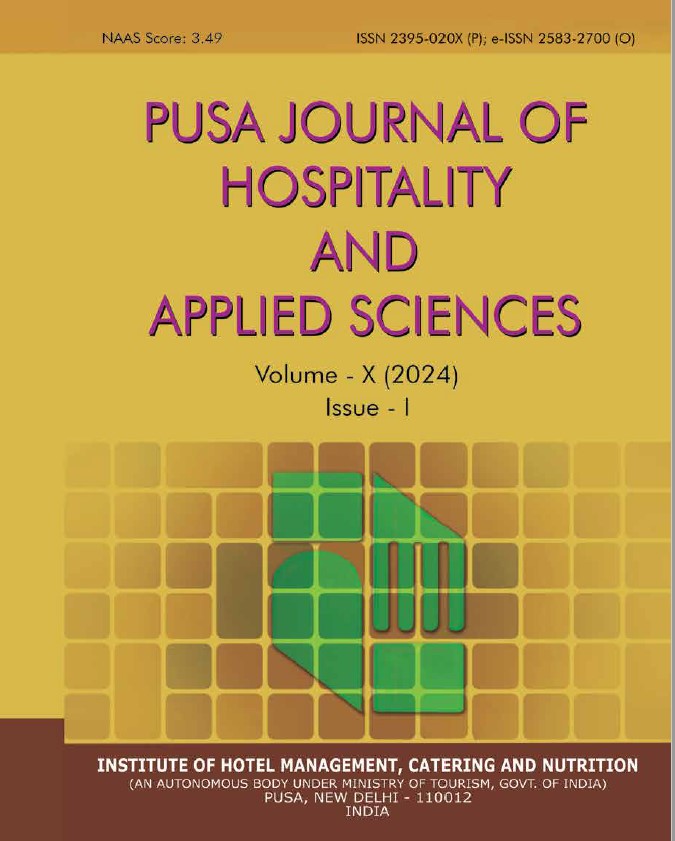Waste Management and Recycle Practices in the Hotel Industry
DOI:
https://doi.org/10.48165/pjhas.2024.10.2.8Keywords:
Delhi, NCR, hotel industry, waste management, recycle practiceAbstract
Background: In the current era of eco-friendly and environmental strategies, waste practices like recycling offer potential benefits for the hotel industry. However, research supporting the financial advantages of these practices is still lacking. Objective: This study aims to explore the waste management which is being produced by the hotel sector and recycle practices which are adopted by the hotel. The study also evaluates the potential environmental benefits of recycling, particularly in relation to reducing greenhouse gas (GHG) emissions. Methodology: Primary data was collected via a questionnaire distributed to 37 hotels, of which 22 expressed interests in completing the questionnaire and participating in face-to-face interviews. SPSS was used for the data analysis and thematic analysis used for analyzing the interview data. Locale of the study was Delhi NCR, Region. Results: The paper’s findings reveal a total waste volume of 584.33 units, with 212.16 units distributed across the different categories such as plastic bottles, other plastic, aluminum etc. The results suggest that hotels need to implement more stringent recycling practices, which would not only benefit the environment but also unlock potential financial advantages. Additionally, promoting guest involvement in recycling initiatives is advised to improve cost-effectiveness and profitability within the industry. Conclusion: Effective waste management and recycling practices are essential for enhancing sustainability in the hotel industry.
References
APAT. (2002). Italian National Agency for the Protection of the Environment for Technical Services. Tourist Accommodation EU Eco-Label Award Scheme – Final Report. In: Italian National Agency for the Protection of the Environment and for Technical Services, Rome, Italy.
Bartone, C., Bernstein., J., & Wright, F. (1990). Investments in Solid Waste Management: Opportunities for Environmental Improvement Infrastructure and Urban Development Department, The World Bank, Available at: http://www.academia.edu/ 5529217/ Investments in Solid Waste Management Opportunities for Environmental Improvement.
Bohdanowicz, P. (2005). Environmental practices and performance of the hotel industry in Europe. Journal of Sustainable Tourism, 13(5), 440-465. https://doi. org/10.1080/09669580508668587.
Bohdanowicz, P. (2006). Environmental awareness and initiatives in the Swedish and Polish hotel industries– survey results. International Journal Hospital Manage. 25, 662–682.
Braun, V., & Clarke, V. (2006). Using thematic analysis in psychology. Qualitative Research in Psychology, 3(2), 77-101. https://doi.org/10.1191/1478088706qp063oa.
Brown, A. (2022). The role of organic waste in sustainable agriculture: Composting food and horticultural waste for soil health. Journal of Environmental Management, 120(4), 78-93.
CSD. (1999). Commission on Sustainable Development. Sustainable Tourism: A Nongovernmental Organization Perspective, New York, USA.
Cummings, S. (1992). Waste reduction strategies in the hospitality industry. Journal of Environmental Management, 36(2), 147-155. https://doi.org/10.1016/ s0301-4797(05)80063-7.
Cummings, S. (1997). The role of recycling in waste management for hotels. Journal of Hospitality and Tourism Research, 21(4), 291-303. https://doi. org/10.1177/109634809702100403.
Goldstein, N. C., & Primlani, R. (2012). Sustainability in the hospitality industry: An analysis of waste management practices. Journal of Sustainable Tourism, 20(4), 529- 544. https://doi.org/10.1080/09669582.2012.657562.
Graci, S., & Dodds, R. (2008). Sustainability in the tourism industry: A case study approach. Journal of Sustainable Tourism, 16(3), 254-272. https://doi. org/10.1080/09669580802159524.
IHEI. (2002). Hotels Care: Community action and responsibility for the environment , London, UK. Community Action and Responsibility for the Environment , London, UK.
IHRA, I. (1995). International Hotel and Restaurant Association (IHRA). Environmental Management Practices in the Hospitality Industry. IHRA.
Kang, (2012). The effects of green practices on hotel guest satisfaction. Journal of Hospitality Management, 31(4), 440-449. https://doi.org/10.1016/j.jhm.2011.11.005. 2012.
Kasim, A. (2009). Managerial attitudes towards environmental management among small and medium hotels in Kuala Lumpur. Journal Sustainable Tourism. 17(6).
Kirk, S. (1995). Environmental management in the hospitality industry. International Journal of Hospitality Management, 14(3), 345-355. https://doi. org/10.1016/0278-4319(95)00015-9.
Kvale, S. (1996). Interviews: An introduction to qualitative research interviewing. Sage Publications.
Malik, S., & Kumar, S. (2012). Management of hotel waste: A case study of small hotels of Haryana state. Journal of Economics and Management 1 (9), ISSN: 2278- 0629.
Masau, A. P., & Prideaux, B. (2003). Environmental management practices in the tourism industry: A case study of Kenya. Tourism Management, 24(5), 537-546. https://doi.org/10.1016/s0261-5177(03)00039-4.
Memon, M.A. (2010). Integrated solid waste management based on the 3R approach. J. Mater. Cycles Waste Manage. 12 (1), 30–40.
Molina-Azorín, J. F., Tarí, J. J., & Pereira-Moliner, J. (2009). Green management and firm performance: An empirical study. Journal of Business Ethics, 85(3), 379- 396. https://doi.org/10.1007/s10551-008-9772-5.
OECD. (2007). Improving Recycling Markets. http://www. oecd.org/ env/waste/38093900.pdf.
Sharma, S. (2016). Waste management practices in the hotel industry: An analysis. Journal of Hospitality and Tourism Management, 27(2), 110-121.
Smith, W. H., Hammer, M. S., & Townsend, J. M. (1993). Eco Purchasing Guide for Hotels and Motels. University of Florida, Gainesville, USA.
Smith, J., & Johnson, R. (2023). Waste management strategies in the hospitality industry: A review of best practices. Journal of Environmental Sustainability, 15(2), 45-60.
Sridang. (2005). Management of solid waste from hotels: A case study in Hat Yai and Phuket cities in Southern Thailand. In: 7th World Congress on Recovery, Recycling and Re-Integration, Beijing, China.
Tang, L. (2004). Waste management strategies for the hospitality industry (Report No. 2004-06). Environmental Protection Agency.
Vahatiitto, T. (2010). The impact of recycling programs on hotel profitability. Journal of Hospitality Management, 29(2), 182-190. https://doi.org/10.1016/j. jhm.2010.01.001.
Wilson, D.C., Velis, C., & Cheeseman, C. (2006). Role of informal sector recycling in waste management in developing countries. Habit. Int. 30, 797–808.




